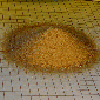Skip over navigation


Or search by topic
Number and algebra
Geometry and measure
Probability and statistics
Working mathematically
Advanced mathematics
For younger learners
Prime AP
Age 16 to 18
Challenge Level 





Show that if three prime numbers, all greater than 3, form an arithmetic progression then the common difference of the progression is divisible by 6.
Find some examples of three primes which include the number 3 and form an AP, and show that in every such case the common difference is not divisible by 6.
You may also like
Janusz Asked
In y = ax +b when are a, -b/a, b in arithmetic progression. The polynomial y = ax^2 + bx + c has roots r1 and r2. Can a, r1, b, r2 and c be in arithmetic progression?
Summats Clear
Find the sum, f(n), of the first n terms of the sequence: 0, 1, 1, 2, 2, 3, 3........p, p, p +1, p + 1,..... Prove that f(a + b) - f(a - b) = ab.

